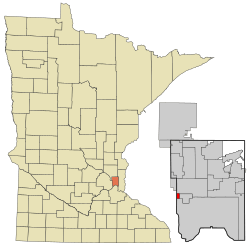Lauderdale, Minnesota facts for kids
Quick facts for kids
Lauderdale
|
|
|---|---|

Location of the city of Lauderdale
within Ramsey County, Minnesota |
|
| Country | United States |
| State | Minnesota |
| County | Ramsey |
| Area | |
| • Total | 0.42 sq mi (1.09 km2) |
| • Land | 0.42 sq mi (1.09 km2) |
| • Water | 0.00 sq mi (0.00 km2) |
| Elevation | 971 ft (296 m) |
| Population
(2020)
|
|
| • Total | 2,271 |
| • Density | 5,420.05/sq mi (2,091.98/km2) |
| Time zone | UTC-6 (Central (CST)) |
| • Summer (DST) | UTC-5 (CDT) |
| ZIP codes |
55108, 55113
|
| Area code(s) | 651 |
| FIPS code | 27-35738 |
| GNIS feature ID | 2395642 |
| Website | www.lauderdalemn.org/ |
Lauderdale is a small city in Ramsey County, Minnesota, United States. In 2020, about 2,271 people lived there. Lauderdale is part of the larger Minneapolis–St. Paul area. It shares borders with big cities like Minneapolis and St. Paul, as well as Roseville and Falcon Heights. It's one of only two cities that touches both Minneapolis and St. Paul.
History
Lauderdale was first known as Rose Hill. It was part of a bigger area called Rose Township, named after a trader named Isaac Rose. This large township included parts of what are now several different cities.
In 1871, the first school in Rose Hill opened. Heman Gibbs, who is famous for the Gibbs Farm Museum, gave the land for this school.
The Village of Lauderdale officially became a city on January 21, 1949. It was named after William Henry Lauderdale. He was a well-known businessman in the Twin Cities area who gave land to Rose Hill Township for a school and a park.
Education
Students in Lauderdale attend schools that are part of the Roseville Area School District (ISD 623).
Also, a part of the Luther Seminary campus is located within Lauderdale's city limits.
Geography
Lauderdale is a small city, covering about 0.42 square miles (1.09 square kilometers) of land. There is no water within the city limits.
Minnesota Highway 280 is an important road that runs through the community, helping people get around.
Population and People
| Historical population | |||
|---|---|---|---|
| Census | Pop. | %± | |
| 1950 | 1,033 | — | |
| 1960 | 1,676 | 62.2% | |
| 1970 | 2,530 | 51.0% | |
| 1980 | 1,985 | −21.5% | |
| 1990 | 2,700 | 36.0% | |
| 2000 | 2,364 | −12.4% | |
| 2010 | 2,379 | 0.6% | |
| 2020 | 2,271 | −4.5% | |
| U.S. Decennial Census | |||
The city's population has changed over the years. In 1950, there were just over 1,000 people. The population grew to its highest in 1990 with 2,700 residents. By 2020, the population was 2,271 people.
Who Lives in Lauderdale?
According to the 2010 census, there were 2,379 people living in Lauderdale. Most residents, about 71%, were White. About 19% were Asian, and 5% were African American. A small number of people were Native American or from other racial backgrounds. About 3% of the population identified as Hispanic or Latino.
The average age in Lauderdale in 2010 was about 31.5 years old. About 18% of the residents were under 18, and 10% were 65 or older. The city had slightly more females (50.6%) than males (49.4%).
See also
 In Spanish: Lauderdale (Minnesota) para niños
In Spanish: Lauderdale (Minnesota) para niños
 | Delilah Pierce |
 | Gordon Parks |
 | Augusta Savage |
 | Charles Ethan Porter |

